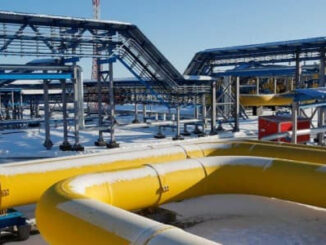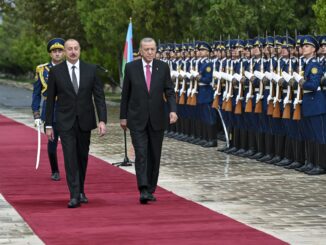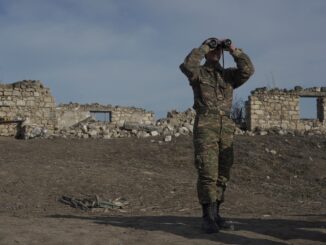
Azerbaijan launched what it called “anti-terrorist activities” in the breakaway region of Nagorno-Karabakh and demanded the “complete withdrawal” of ethnic Armenian forces as a condition for peace in the disputed territory.
Armenia’s Ministry of Foreign Affairs has meanwhile called on Russian peacekeeping troops in the Armenian-majority region to intervene and stop what it said was Azerbaijan’s “full-scale aggression” against the local population.
list of 3 items
list 1 of 3
‘Baku’s promise was broken’: World decries Nagorno-Karabakh flare up
list 2 of 3
Azerbaijan launches new military operation in Nagorno-Karabakh
list 3 of 3
Humanitarian aid enters Nagorno-Karabakh via Armenia, Azerbaijan
end of list
Here’s what we know so far.
What triggered the latest offensive?
Baku’s statement announcing the offensive came a few hours after Azerbaijan’s Ministry of Foreign Affairs said at least six people had died in two accidents in the Azeri Khojavend district, allegedly due to landmines installed by Armenia’s security forces.
But in recent weeks, Armenia has accused Azerbaijan of building up troops and decried a blockade of its only land link to Nagorno-Karabakh.
Armenia claimed Azerbaijan was behind a months-long humanitarian crisis in Nagorno-Karabakh after Baku last year blocked the sole road linking the mountainous region with Armenia. It is called the Lachin Corridor, and Russian peacekeepers police it.
On Monday, trucks loaded with humanitarian aid entered Nagorno-Karabakh after Armenian separatists and the central government agreed to use roads linking the region to both Armenia and Azerbaijan, according to Baku.
What have been the developments so far?
Azerbaijan’s Ministry of Defense announced on Tuesday that “local anti-terrorist activities carried out by the Armed Forces of Azerbaijan in the Karabakh region of Azerbaijan were ongoing.”
In the same statement, it said that “as part of the activities, only legitimate military installations and infrastructure are targeted and incapacitated using high-precision weapons”. It added that it has created humanitarian corridors to allow the evacuation of civilians.
Meanwhile, Armenian Prime Minister Nikol Pashinyan urged Russia and the United Nations to take action to stop the fighting.
Al Jazeera’s Robin Forestier-Walker, who has extensively covered events in Nagorno-Karabakh, said reports from inside the region spoke of “large-scale attacks in the form of potential rocket attacks and shelling” while the sound of small-arms fire could be heard in videos posted on social media.
Hikmet Hajiyev, foreign policy adviser to Azerbaijan President Ilham Aliyev, told Reuters that Azerbaijani forces have broken through a line of contact with Armenian forces in Nagorno-Karabakh in several places and are determined to fulfil their strategic goals,
Armenia has denied having any forces in the area. However, many Armenians have in the past volunteered to fight for Nagorno-Karabakh.
(Al Jazeera)
What is the possible fallout?
Reporting from Moscow, Al Jazeera’s Yulia Shapovalova said that the recent aggression could lead to further escalation and the outbreak of a new war between the two sides.
“According to Pashinyan [the prime minister of Armenia], Azerbaijan is trying to drag Armenia into yet another war, but Armenia is not going to launch any military operations,” she said, adding that for Baku the only route to peace is a complete withdrawal of Armenian troops from the area – a condition Armenia refuses to meet.
Al Jazeera’s Forestier-Walker said there was “great fear” that Tuesday’s operations could be the start of another large-scale war between the two neighbours.
He noted that the situation has been “dire” for months for the population of Nagorno-Kabarakh.
“They have been cut off from the main roads supplying Karabakh from Armenia,” Forestier-Walker said.
“Things have been shifting recently. The authorities in Azerbaijan were able to get some aid into Karabakh from the Azeri side of control, but they were still putting pressure on the access of Karabakh from Armenia because the Azeri authorities have claimed for a long time that this route is being used to smuggle in weapons and mines into the territory that is still under ethnic Armenian control.”
How has the world reacted?
Russia expressed deep alarm at “the sharp escalation” in the contested region, the TASS news agency reported, citing Ministry of Foreign Affairs spokesperson Maria Zakharova. She said Azerbaijan had warned Russian peacekeepers in the region about military action just minutes before launching it.
UN spokesman Stephane Dujarric also expressed concern. “It’s very important that all the activities cease and both parties go back to a sustained dialogue to avoid any further clashes,” he told Al Jazeera.
The European Union condemned the escalation in Nagorno-Karabakh and called on Azerbaijan to stop its military activities, the EU’s foreign policy chief Josep Borrell said in a statement.
“We call for the immediate cessation of hostilities & Azerbaijan to stop the current military activities,” he said on social media platform X, formerly known as Twitter.
Meanwhile, German Foreign Minister Annalena Baerbock said that Azerbaijan had broken its promise by resorting to military action in Nagorno-Karabakh, while Paris called for an urgent UN Security Council meeting to end the crisis.
A United States official said that US Secretary of State Antony Blinken will hold urgent talks Tuesday with all sides to end the “egregious” operation by Azerbaijan.
After the opening of an aid path on Monday, “We were hopeful that we were going to be able to adapt to the longer-term issues,” said the official.
What is the history behind the tensions?
Renewed fighting in the region comes almost three years after a brief but brutal war with Armenia over the area, in which more than 6,000 people were killed.
The ex-Soviet Caucasus rivals have been locked in a decades-long dispute with large-scale hostilities breaking out in the 1990s and in 2020.
The last large-scale conflict in Nagorno-Karabakh lasted for six weeks in 2020 before a Russian-brokered truce. The ceasefire saw Armenia cede swathes of territory it had controlled since the 1990s.
The two sides have since been unable to reach a lasting peace settlement despite mediation by the European Union, Russia and the US.
UN expresses concern as the EU condemned the escalation in Nagorno-Karabakh and called on Azerbaijan to stop activities.
ENB Top News
ENB
Energy Dashboard
ENB Podcast
ENB Substack



